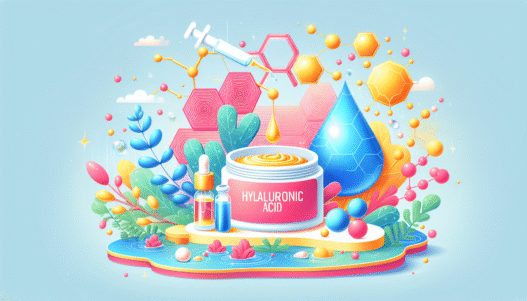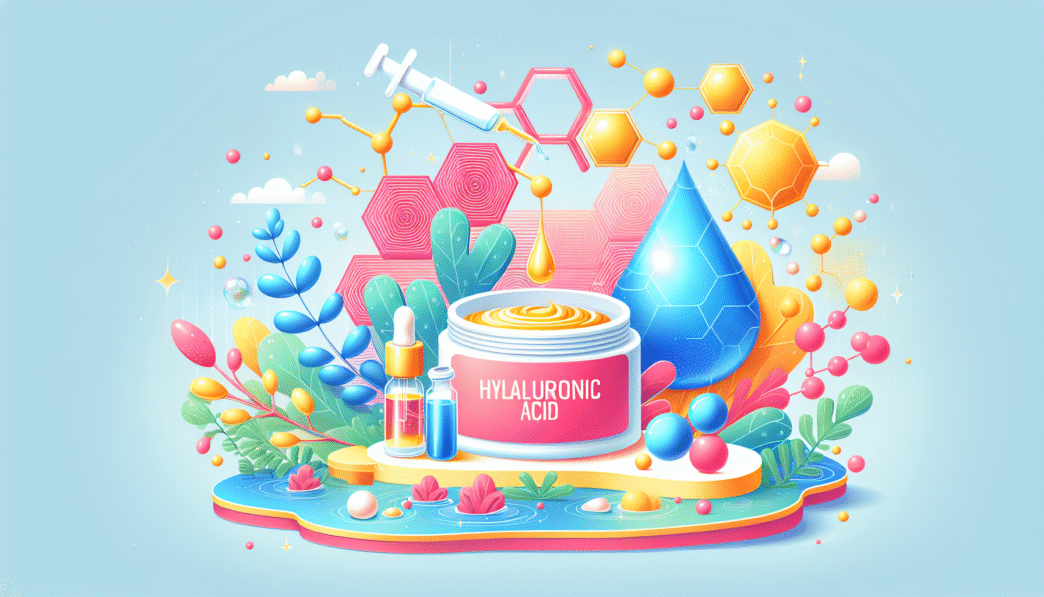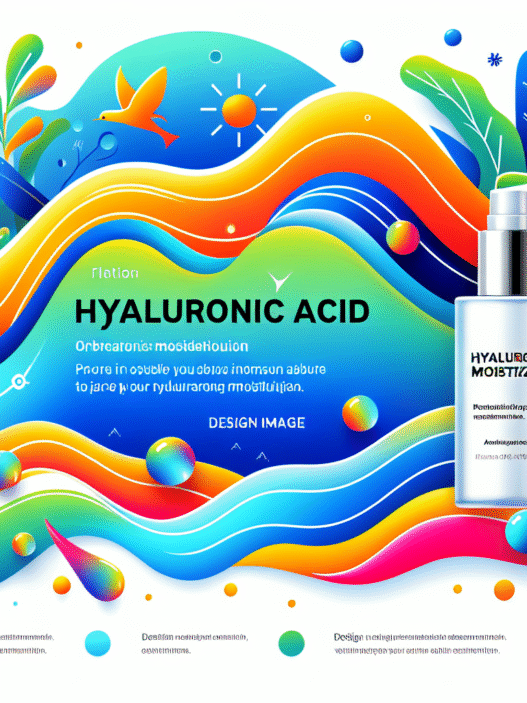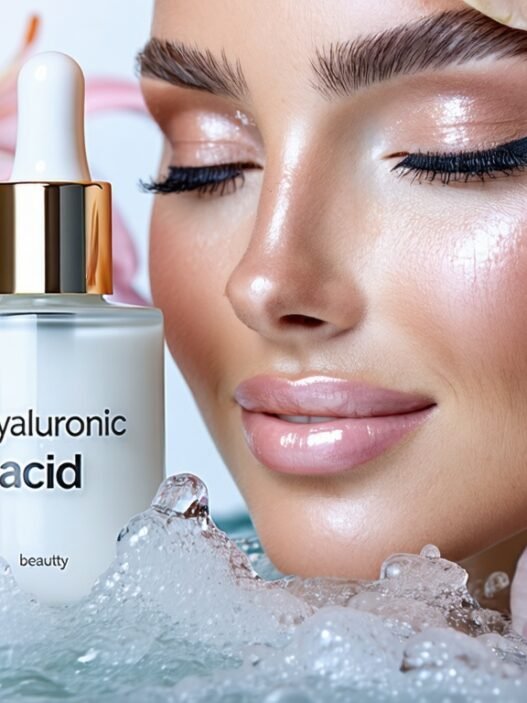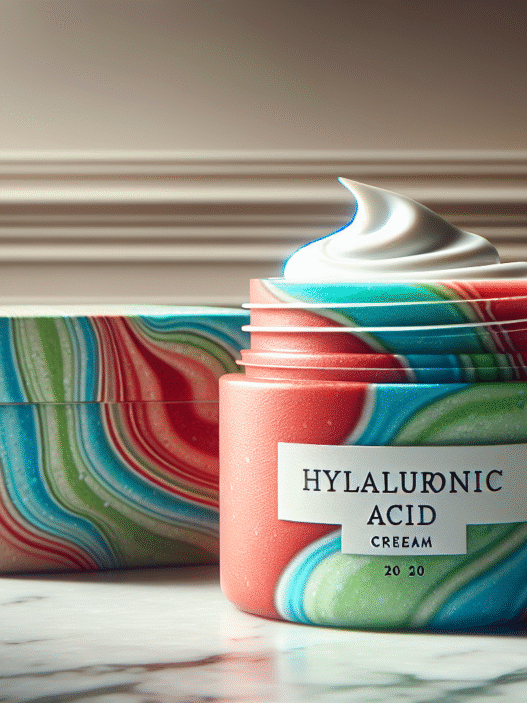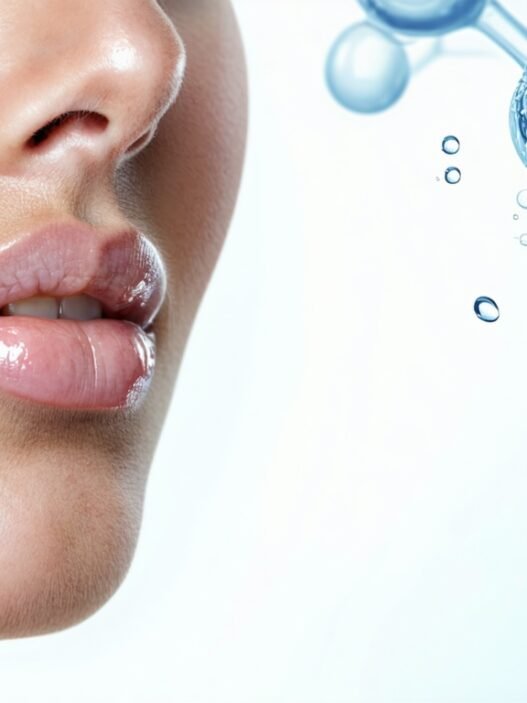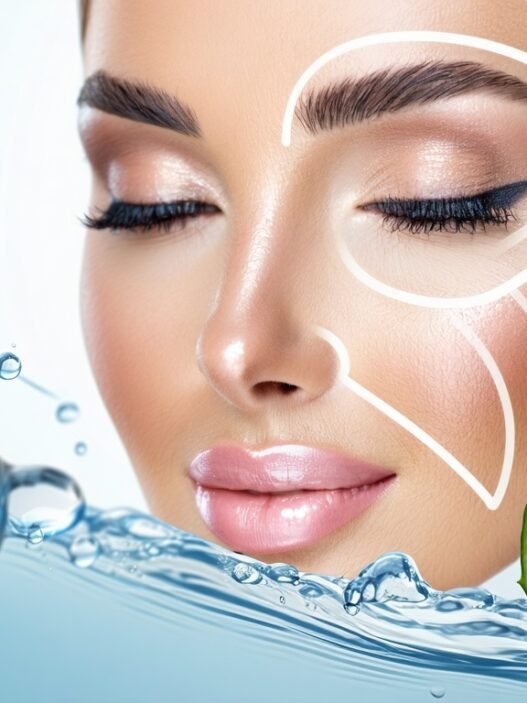Understanding Hyaluronic Acid
Introduction to Hyaluronic Acid
Hyaluronic acid is a naturally occurring substance in the body, renowned for its impressive ability to retain moisture and support various bodily functions. With its high water-binding capacity, it can hold up to 1,000 times its weight in water, making it a powerful ingredient in skincare and beauty products. This ability to retain moisture is crucial for maintaining skin hydration and elasticity, which is a major reason behind its popularity among beauty and skincare enthusiasts.
Hyaluronic acid functions as a humectant, drawing water from the environment into the skin, which helps to give it a plump, radiant appearance. Many skincare formulations, such as hyaluronic acid serum and hyaluronic acid moisturizer, incorporate this beneficial ingredient to achieve optimal skin hydration.
Role of Hyaluronic Acid in the Body
Hyaluronic acid plays multiple vital roles within the body. It is particularly abundant in the skin, eyes, and joints, which showcases its importance as a versatile substance. Almost half of the body’s total hyaluronic acid is found in the skin, where it helps to keep the skin hydrated and youthful in appearance (Healthline).
| Location | Function |
|---|---|
| Skin | Maintains moisture, enhances elasticity, and contributes to a plump appearance |
| Joints | Acts as a lubricant and shock absorber, improving joint function and reducing pain |
| Eyes | Helps retain moisture and supports tissue hydration |
Hyaluronic acid also aids in wound healing by acting as a scaffold for tissue growth, facilitating the repair of damaged tissues. It can attach to cells, which makes it a candidate for targeted medication delivery in medical treatments (Cleveland Clinic). Its unique properties not only improve skin conditions but also offer joint and eye health benefits, establishing it as a substance of interest in both beauty and medical fields.
By incorporating hyaluronic acid into daily beauty regimes, one can take advantage of its remarkable anti-aging benefits, leading to improved skin texture and hydration, ultimately contributing to a youthful and vibrant appearance.
Benefits for Skin
Hyaluronic Acid for Skin Hydration
Hyaluronic acid is widely recognized for its excellent skin hydration properties. It is a naturally occurring substance in the body, especially in connective tissues, skin, and cartilage. With its unique molecular structure, hyaluronic acid can retain significant amounts of water, making it an effective water magnet that supports hydration in the skin without causing dehydration.
Studies have demonstrated the positive effects of topical hyaluronic acid on skin hydration. In a 2021 study involving 40 females aged 30 to 65 showing signs of skin photoaging, it was found that applying hyaluronic acid twice daily led to improved hydration. Furthermore, a 2023 study with 123 females of varying ages and skin types indicated that oral hyaluronic acid supplementation significantly enhanced skin hydration, tone, and epidermal thickness (Medical News Today).
Here’s a summary of the hydration benefits:
| Study | Participants | Key Findings |
|---|---|---|
| 2021 Study | 40 females, aged 30-65 | Improved skin hydration with topical use |
| 2023 Study | 123 females, various ages | Enhanced hydration, tone, and epidermal thickness with oral use |
Improving Skin Tone and Texture
Hyaluronic acid not only hydrates the skin but also contributes to improving overall skin tone and texture. Its versatility includes benefits in rejuvenation, healing, and elasticity. The hygroscopic, rheological, and viscoelastic properties of hyaluronic acid make it a key ingredient in skincare products aimed at enhancing skin appearance and firmness.
Topical applications of hyaluronic acid can boost skin elasticity and reduce the appearance of wrinkles, making it a valuable component in anti-aging skincare treatments. Clinical studies indicate that it can significantly improve skin hydration, reduce fine lines, and increase overall skin quality.
Hyaluronic acid aids in wound healing and regulates inflammation, which further supports skin rejuvenation. It is effective for minor and severe skin conditions, including burns and surgical scars (Medical News Today).
Here’s a table summarizing the effects of hyaluronic acid on skin tone and texture:
| Benefit | Description |
|---|---|
| Improved Elasticity | Enhances the skin’s ability to stretch without losing its firmness. |
| Reduced Wrinkles | Smooths fine lines and gives a more youthful appearance. |
| Even Skin Tone | Helps to brighten and maintain a uniform complexion. |
Incorporating hyaluronic acid into a daily skincare routine, whether through hyaluronic acid serums, moisturizers, or other topical applications, can lead to remarkable improvements in skin texture and overall appearance.
Oral Hyaluronic Acid
Benefits for Joint Health
Oral hyaluronic acid has gained recognition for its potential benefits in joint health, particularly for individuals suffering from arthritis. It helps improve joint lubrication, which is essential for reducing pain and stiffness associated with conditions such as osteoarthritis. In a 2020 clinical trial, participants with knee osteoarthritis who took oral hyaluronic acid supplements reported reduced pain and improved overall joint function.
Hyaluronic acid acts as a cushioning agent in the joints, allowing for smoother movement and less discomfort during activity. Its ability to retain moisture plays a pivotal role in maintaining joint health, making it a viable option for individuals seeking non-invasive treatments for joint pain.
| Study | Participants | Outcome |
|---|---|---|
| 2020 Clinical Trial | 60 with knee osteoarthritis | Reduced pain and improved joint function |
| 2021 Clinical Trial | Combination of hyaluronic acid, glucosamine, and chondroitin | Improved pain and function over 8 weeks |
Effectiveness in Osteoarthritis Management
Oral hyaluronic acid is particularly effective for individuals with mild to moderate osteoarthritis. Research suggests that it may be more advantageous for those over the age of 60 when compared to traditional injections. This option is especially beneficial for individuals who may not be able to use nonsteroidal anti-inflammatory drugs (NSAIDs) or corticosteroids for arthritis management, providing an appealing alternative (Healthline).
In a recent clinical trial, a combination supplement that included oral hyaluronic acid, glucosamine, and chondroitin showcased positive results, highlighting the importance of comprehensive treatment approaches in managing joint pain effectively. The benefits of oral hyaluronic acid in joint health are significant, marking a noteworthy addition to discussions surrounding hyaluronic acid benefits for both skin and overall wellness.
Safety and Side Effects
Safety of Hyaluronic Acid Products
Hyaluronic acid is recognized for its safety profile in various applications, including skincare and oral supplements. Over-the-counter hyaluronic acid serums and products applied to the skin are commonly deemed safe for use (Cleveland Clinic). Moreover, hyaluronic acid supplements taken orally have also been suggested to be safe for most individuals.
When considering hyaluronic acid injections used for cosmetic purposes, it is essential to ensure that these injections are administered by licensed medical professionals. Following the instructions provided by healthcare providers when using prescription hyaluronic acid products is crucial for safety and effectiveness.
Potential Side Effects and Allergic Reactions
While hyaluronic acid is generally considered safe, some individuals may experience mild side effects. Common side effects can include:
| Side Effect | Description |
|---|---|
| Redness | Irritation or redness at the application site |
| Swelling | Minor swelling near injection areas |
| Itching | Slight itching or discomfort |
| Dryness | Occasional dryness in areas of application |
Severe allergic reactions are rare but can occur, manifesting symptoms such as significant swelling, rash, or difficulty breathing. Anyone who experiences these symptoms should seek medical attention promptly.
Though there is limited evidence regarding the effectiveness of hyaluronic acid in treating acne scars or in combination with other medications for acne, it is often utilized in facial fillers for such purposes (Cleveland Clinic).
As with any skincare product, it is advisable to conduct a patch test before using hyaluronic acid formulations. For those interested in exploring hyaluronic acid’s various applications, refer to our articles on hyaluronic acid moisturizer and hyaluronic acid serum for extensive information.
Different Forms of Hyaluronic Acid
Hyaluronic acid can be found in various forms, primarily through topical applications and oral supplements. Each form offers distinct benefits and can be incorporated into different aspects of a skincare or health regimen.
Topical Applications
Topical hyaluronic acid is widely used in skincare products due to its ability to hydrate and plump the skin. A 2021 study showed that applying topical hyaluronic acid twice a day significantly improved skin hydration in women aged 30 to 65 with signs of photoaging. Participants also reported improvements in skin texture and overall appearance after six weeks of consistent use (Medical News Today).
Typically, hyaluronic acid is available in serums, creams, and injectable fillers. These products work by binding and retaining water, a crucial factor in maintaining skin moisture. With natural levels of hyaluronic acid decreasing as one ages, incorporating it into a skincare routine can help address aging signs such as fine lines and reduced skin elasticity.
The recommended application of topical hyaluronic acid is after cleansing and toning, but before applying other treatments like oils or creams. This ensures optimal hydration and maximizes the ingredient’s benefits. For a popular option, check out hyaluronic acid serum or hyaluronic acid cream for effective skin hydration.
| Form | Application Method | Key Benefits |
|---|---|---|
| Serum | Apply after cleansing | Deep hydration, improves elasticity |
| Cream | Use as a moisturizer | Locks in moisture, smoothens skin texture |
| Injectable | Professional treatment | Immediate plumping effect, reduces wrinkles |
Oral Supplements
Oral hyaluronic acid supplements have gained popularity for their potential benefits not only for skincare but also for joint health. While topical applications target surface hydration, oral forms aim to provide systemic benefits. These supplements are believed to help maintain the elasticity of skin and connective tissues while supporting joint function.
Research indicates that oral hyaluronic acid may be effective in managing conditions like osteoarthritis by enhancing joint lubrication and reducing discomfort. For more information on using hyaluronic acid for joint health, refer to our article on hyaluronic acid for joints.
Available in various forms such as capsules and powders, oral supplements can be a convenient addition to one’s daily routine. When considering hyaluronic acid supplements, it is advisable to consult with a healthcare provider to determine the right dosage and ensure safety.
| Form | Application Method | Key Benefits |
|---|---|---|
| Capsules | Taken daily | Supports joint health, aids skin hydration |
| Powders | Mixed with beverages | Convenient intake, versatile for daily use |
Incorporating hyaluronic acid, whether topically or orally, offers a multifaceted approach to skincare and overall health. Always consider the specific needs and consult professionals when trying new products or supplements. For more on supplements, visit our page on hyaluronic acid supplements.
Research and Studies
Clinical Evidence and Trials
The effectiveness of hyaluronic acid in skincare has been validated through various studies and clinical trials. A significant review in 2022 highlighted that topical hyaluronic acid is a well-tolerated and effective treatment for skin aging, especially after facial or postsurgical rejuvenation procedures. Moreover, research suggests that hyaluronic acid fillers can extend the results of Botox injections used for reducing skin wrinkles, indicating a synergistic effect in wrinkle management (Medical News Today).
In a 2021 study involving 40 women aged 30 to 65 with signs of photoaging, applying topical hyaluronic acid twice daily significantly improved skin hydration. Similarly, a 2023 study involving 123 women of various ages and skin types found that oral hyaluronic acid not only enhanced skin hydration but also improved skin tone and epidermal thickness (Medical News Today).
The following table summarizes findings from these significant studies regarding the use of hyaluronic acid for skincare:
| Study Year | Participants | Treatment | Results |
|---|---|---|---|
| 2021 | 40 females, ages 30-65 | Topical HA, twice daily | Improved skin hydration |
| 2023 | 123 females, various ages/types | Oral HA | Enhanced skin hydration, tone, increased epidermal thickness |
Hyaluronic Acid in Skincare Products
Hyaluronic acid is a key ingredient in many skincare formulations, lauded for its ability to retain moisture, enhance skin elasticity, and provide a plumping effect. For instance, products such as the bestselling Hyaluronic Acid 2% + B5 by The Ordinary specifically target issues like poor skin elasticity and dryness, showing immediate results in hydration and skin elasticity.
Additionally, clinical trials have demonstrated that combining a hyaluronic acid epidermic filler with Botox injections significantly extends the effect of Botox over a six-month period, highlighting how hyaluronic acid can enhance the longevity of cosmetic treatments (PubMed Central).
Overall, the robust body of clinical evidence supports the widespread use of hyaluronic acid in skincare products, illustrating its effectiveness in improving skin properties and addressing signs of aging. For a deeper dive into different forms of hyaluronic acid, including hyaluronic acid serum and hyaluronic acid moisturizer, consult related articles.










